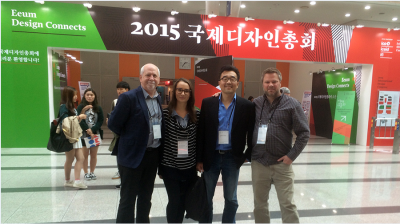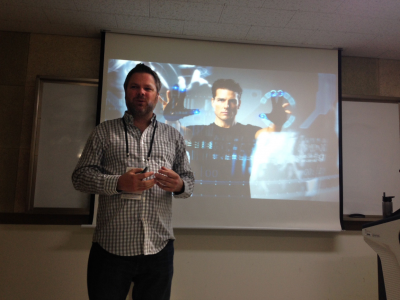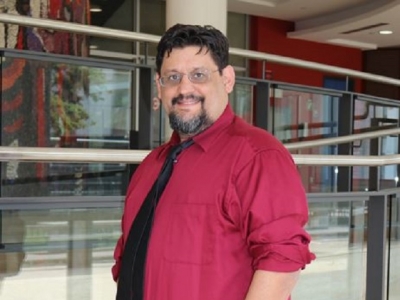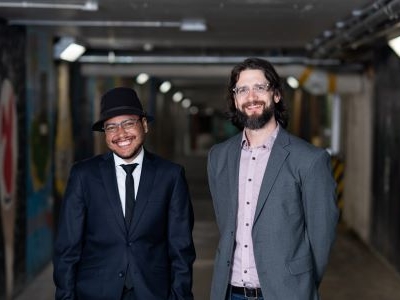Last year, during his first year of the Master of Design program (MDes), Jed Looker travelled to Korea to present his first published paper at Eeum Design Connects, a global design conference. What happened next took him by surprise.

(L to R) Prof. Thomas Garvey, MDes student Ellen Hrinivich, Prof. WonJoon Chung & Jed Looker at Eeum conference
He met one of the keynote speakers, Sheila, at a networking party. After discussing his paper for a bit and noting that she was Canadian, Looker asked her what she did back home.
“She said she had retired from politics and, after taking a closer look at her name tag, I clued in. I was speaking with Sheila Copps, former Deputy Prime Minister of Canada! I kept thinking how neat it was to be half way around the world speaking to a former Member of Parliament about the role of design in developing sustainable policies in Canada.”
Looker first got interested in the MDes program after having an “exciting” conversation with Lois Frankel, the Graduate Supervisor of Carleton’s Master of Design program at that time. Looker already had created his own business that included a team of designers and developers that he hired for different projects. His work received critical acclaim, including a Summit Creative Award for web design, and a W3 Award for visual appeal.
After six years, he closed shop for a teaching position at Algonquin College’s School of Media and Design, where he still teaches today.
“I know what it’s like to be on the front line, to collaborate with different kinds of professionals and clients, and I know how to learn,” says Looker. “That is perhaps the most important skill–the ability to teach yourself new tricks.”

Looker’s research in the MDes program combines his interests as a designer and an educator. He is researching how undergraduate design programs are developing curriculum to prepare students for the “solutions economy”. This economy takes a more creative and often design-centric approach to challenge businesses, governments, philanthropists, and social enterprises to work collaboratively to solve pressing societal problems.
Looker cites the United Nations Global Goals for Sustainable Development as a great example of the kinds of challenges to overcome.
He says that, in the future, a solutions economy will require design professionals with the skills to come up with solutions to a new kind of project.
Says Looker: “Arguably, many graduate design programs prepare students for this kind of work, but what of undergraduate programs? I feel the primary role of undergraduate educators is to prepare students for industry. For the most part, students are coming to university and college to get a job. My research will help undergraduate design school educators looking to update their curriculum to better align with opportunities created by the solutions economy.”
He says this kind of updated curriculum could have far-reaching effects. “For example, you might one day notice it is easier to renew your driver’s licence, or the air is cleaner in your city thanks to a new transportation initiative.”
Looker says the support he has received from the School of Industrial Design has been invaluable. “I would like to give a shout out to my advisor, Thomas Garvey, whose support and mentorship has afforded me the opportunity to speak at conferences and publish.”
More information about the Master of Design program can be found by clicking here. The MDes is a research-focused program for candidates, like Looker, who have prior design training and/or professional experiences who want to probe more deeply into issues related to design research, strategic design planning, knowledge creation and dissemination and interdisciplinary design development to could add new knowledge to the design world.
Thursday, January 28, 2016 in Grad Student Research, News, Programs
Share: Twitter, Facebook





